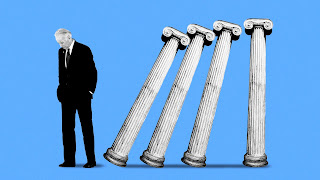Senate Committee Hears Testimony on Regulating Facebook
 |
| Matt McClain/The Washington Post via AP, Pool |
There are two possible arguments to be made in why regulation in the social media and tech industry is slow and difficult to come by. 1) As I have pointed out in previous posts on this blog, at what point does this become a first amendment and constitutional issue? Regulation of private companies is by no means unconstitutional, however companies that deal explicitly in private citizen's speech? This is where lines can get blurred and should this go farther, I am sure will be brought up. And 2) as Sen. Klobuchar pointed out, special interests and lobbyists in Washington have little desire for further regulation of this industry and will certainly put their money where their mouths are to ensure restrictive legislature is difficult to pass.



I wanted to write on this subject as well, but you beat me to it lol. I really like how you wrote about this topic, you wrote about it differently than I would, which makes me think. I also like how you provided two possible arguments for the slow and difficult regulation in social media and tech. Facebook has been under a lot of heat lately, but I don't think the solution is more regulation, I'm honestly not sure what the solution is...
ReplyDeleteRegulating Facebook is not what the shareholders want. The shareholders want to continue to divide the American people, as this helps them stay in power. Facebook is known for spreading misinformation and fake news, and this hurts our democracy. Special interest lobbyists are paid to work against regulations of corporations and social media companies. These lobbyists ultimately write a lot of the legislation that is voted on by Congress.
ReplyDeleteI think it's interesting to see how they handle this issue. I don't know if more regulation will actually help the problem or not. Theres always going to be someone out there spreading misinformation, individuals not necessarily public pages. I do think more regulation and precautions could help stop pages and groups from posting misinformation but then there's individual persons who will always share their opinions (even though those opinions might be based on non-factual information). Then the issue of free speech gets brought to question...so I'm not entirely sure what they can do to help the issue. I think we as Americans need to just be more informed on how to spot misinformation and to research things for ourselves from credible sources.
ReplyDelete